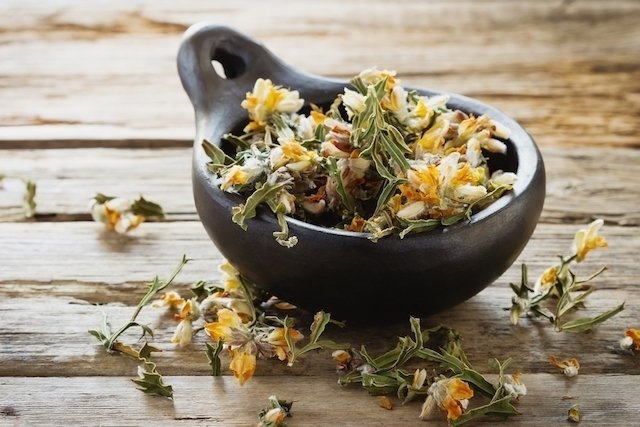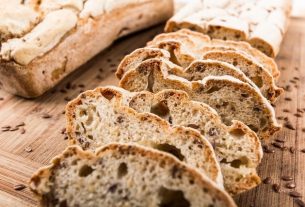Some home remedies that help prevent and alleviate the symptoms of diverticulitis are anise tea, green tea, green juice with ginger, aloe vera juice and carqueja tea.
These natural remedies improve digestion, combat pain and inflammation, because they are rich in phenolic compounds with antioxidant, analgesic and anti-inflammatory properties, helping to restore the intestine and preventing diverticulitis attacks.
Diverticulitis is the inflammation and/or infection of the diverticula, which are small pockets present in the walls of the intestine, which causes symptoms such as periods of alternating diarrhea and constipation, abdominal pain, nausea and loss of appetite. Learn more about diverticulitis.

Some home remedies for diverticulitis are:
1. Fennel tea
Fennel tea is a good option for a home remedy for diverticulitis, because it contains anethole, eugenol and linalool, which are bioactive compounds with analgesic, digestive and anti-inflammatory effects, helping to alleviate symptoms such as poor digestion and pain. Check out all the benefits of fennel tea.
Ingredients:
- 1 teaspoon of dried fennel seeds;
- 1 cup (tea) of water.
Preparation mode:
Mash or crush the fennel seeds. In a pan, add water and bring to a boil. After turning off the heat, add the fennel seeds, cover the pan and let it rest for 10 minutes. Strain the tea and drink it immediately. You can consume up to 3 cups of anise tea per day, for up to 2 weeks in a row.
Fennel tea should not be used by anyone who is allergic to anise or the compound anethole. Likewise, this tea should not be used by pregnant or breastfeeding women and children under 12 years of age.
Furthermore, this tea should be avoided by women with breast cancer or people using anticoagulant medications.
2. Green tea
Because it contains catechins, which are phenolic compounds with anti-inflammatory and antioxidant action, green tea strengthens the beneficial bacteria in the intestine, helping to treat diverticulitis.
Ingredients:
- 1 cup of water;
- 1 teaspoon of green tea.
Preparation mode:
In a pan or kettle, boil the water. After turning off the heat, add the green tea leaves, cover the pan or kettle and let it rest for 10 minutes. Strain and drink cold or warm. It is recommended to drink a maximum of 4 cups of green tea per day, between meals.
Green tea should not be consumed by children, pregnant or breastfeeding women, people with insomnia, hyperthyroidism, gastritis or gastric ulcers. Furthermore, you should avoid drinking this tea at the end of the day or in quantities greater than recommended.
Furthermore, green tea can alter the action of anticoagulants, medicines for high blood pressure and high cholesterol and, therefore, in these cases, consumption of green tea should only be done after a doctor’s advice.
3. Aloe vera juice
Aloe vera juice, which is also known as aloe vera, contains polyphenols with anti-inflammatory properties, making it a good option to help treat diverticulitis. Learn more about aloe vera juice.
To prepare aloe vera juice, you must remove the leaves from the plant, wash and dry them well, and cut off the thorns. Afterwards, cut the base of the leaf and let the plant rest in a vertical position so that the latex drains.
Then, cut the sides of the leaf along its length, lay the leaf down and carefully lift the bark on one side with a rounded object. Remove the gel from the plant with a spoon and discard any green or yellow parts present in the gel. Finally, just put 100 g of gel and 1 liter of water in the blender, blend well and then drink.
This juice is not recommended for children, pregnant and breastfeeding women, people with uterine or ovarian inflammation, hemorrhoids, anal fissures, bladder stones, varicose veins, kidney failure, appendicitis, prostatitis, cystitis, dysentery or nephritis.
4. Chamomile and valerian tea
Chamomile and valerian have anti-inflammatory, relaxing, healing and antispasmodic actions, and therefore help in the treatment of diverticulitis, reducing the production of inflammatory substances and relieving pain.
Ingredients:
- 1 tablespoon of dried chamomile leaves;
- 1 tablespoon of dry valerian root;
- ½ liter of water.
Preparation mode:
In a pan, boil the water. After turning off the heat, add the chamomile and valerian to the pan, cover and let it rest for approximately 10 minutes. Drink a maximum of 2 cups of this tea per day.
Chamomile tea with valerian should not be recommended for pregnant or breastfeeding women, for people allergic to chamomile and plants in the same family as chamomile, such as daisy, ragweed and chrysanthemums. This tea is also not recommended for babies under 6 months.
Furthermore, people who use anticoagulant medications, sedatives, analgesics, muscle relaxants or anticonvulsants, for example, should speak to a doctor before drinking this tea.
5. Green juice with ginger
Green juice helps increase fiber consumption throughout the day, improving intestinal transit and helping to treat diverticulitis.
Ginger contains bioactive compounds, such as cineole and borneal, which act as powerful anti-inflammatories and analgesics, relieving pain and inflammation in the intestine.
Ingredients:
- 1 cabbage leaf;
- 1 dessert spoon of fresh mint leaves;
- 1 lemon juice;
- 1/2 apple with peel;
- 1/2 cucumber;
- 1 teaspoon of fresh grated ginger;
- 2 glasses of filtered or boiled water;
- Ice cubes to taste.
Preparation mode:
Wash the cabbage and mint leaves, the apple and the cucumber well. Cut the apple and cucumber into cubes and place in a blender. Place the other ingredients in the blender and blend for 3 minutes or until the mixture is very homogeneous. Strain and drink afterwards.
As it contains ginger, this juice is not recommended for those with gallstones. It is also contraindicated for people with bleeding diseases or who use anticoagulant medications.
People who use medications to control high blood pressure and diabetes, and pregnant women should only consume ginger under the guidance of a doctor.
6. Turmeric tea
Turmeric tea can help treat diverticulitis, as it is rich in curcumin, a bioactive compound that works to reduce inflammation and relieve pain. See all the health benefits of turmeric.
Ingredients:
- 1 teaspoon of turmeric powder;
- 150 ml of water.
Preparation mode:
Boil water in a pan or kettle. Remove the pan from the heat, add the turmeric powder, stirring well, cover and let it rest for 10 minutes. Drink up to 3 cups of this tea per day, between meals.
This tea is contraindicated for people who use anticoagulant medications or who have blockage of the bile ducts due to the presence of gallstones.
Additionally, during pregnancy or breastfeeding, turmeric should only be used under the guidance of a doctor.
7. Carqueja tea
Carqueja is rich in rutin, luteolin and apigenin, which are flavonoids with anti-inflammatory action that reduce the production of inflammatory substances, therefore being very useful to complement the treatment of diverticulitis.
Ingredients:
- 2 tablespoons of carqueja stems;
- 1 liter of water.
Preparation mode:
In a pan, boil the water and, after turning off the heat, add the carqueja stems. Cover the pan and let it rest for 10 minutes. Strain and drink up to 3 cups per day.
Carqueja tea is not recommended for children or pregnant or breastfeeding women. Furthermore, people who use medication to control diabetes or high blood pressure should only drink this tea under the guidance of a doctor.
8. Cat’s claw tea
Cat’s claw tea helps treat intestinal inflammation, such as diverticulitis, as well as strengthening the immune system and repairing damage to intestinal cells.
These benefits are possible because cat’s claw contains great amounts of polyphenols, flavonoids, which are antioxidant, immunomodulatory and anti-inflammatory compounds.
Ingredients:
- 20 g of peels and roots of cat’s claw;
- 1 liter of water.
Preparation mode:
Place the water and cat’s claw in a pan and bring to a boil for 10 minutes. Turn off the heat and let the mixture rest for another 10 minutes. Strain and drink every 8 hours, between meals.
This tea is not recommended for children, pregnant or breastfeeding women, or people who are allergic to this medicinal plant.
Cat’s claw tea should also not be consumed by people with diseases such as lupus erythematosus, multiple sclerosis, kidney disease or leukemia, with blood clotting problems or who are using anticoagulants.

Sign up for our newsletter and stay up to date with exclusive news
that can transform your routine!
Warning: Undefined array key "title" in /home/storelat/public_html/wp-content/plugins/link-whisper-premium/templates/frontend/related-posts.php on line 12
Warning: Undefined array key "title_tag" in /home/storelat/public_html/wp-content/plugins/link-whisper-premium/templates/frontend/related-posts.php on line 13



